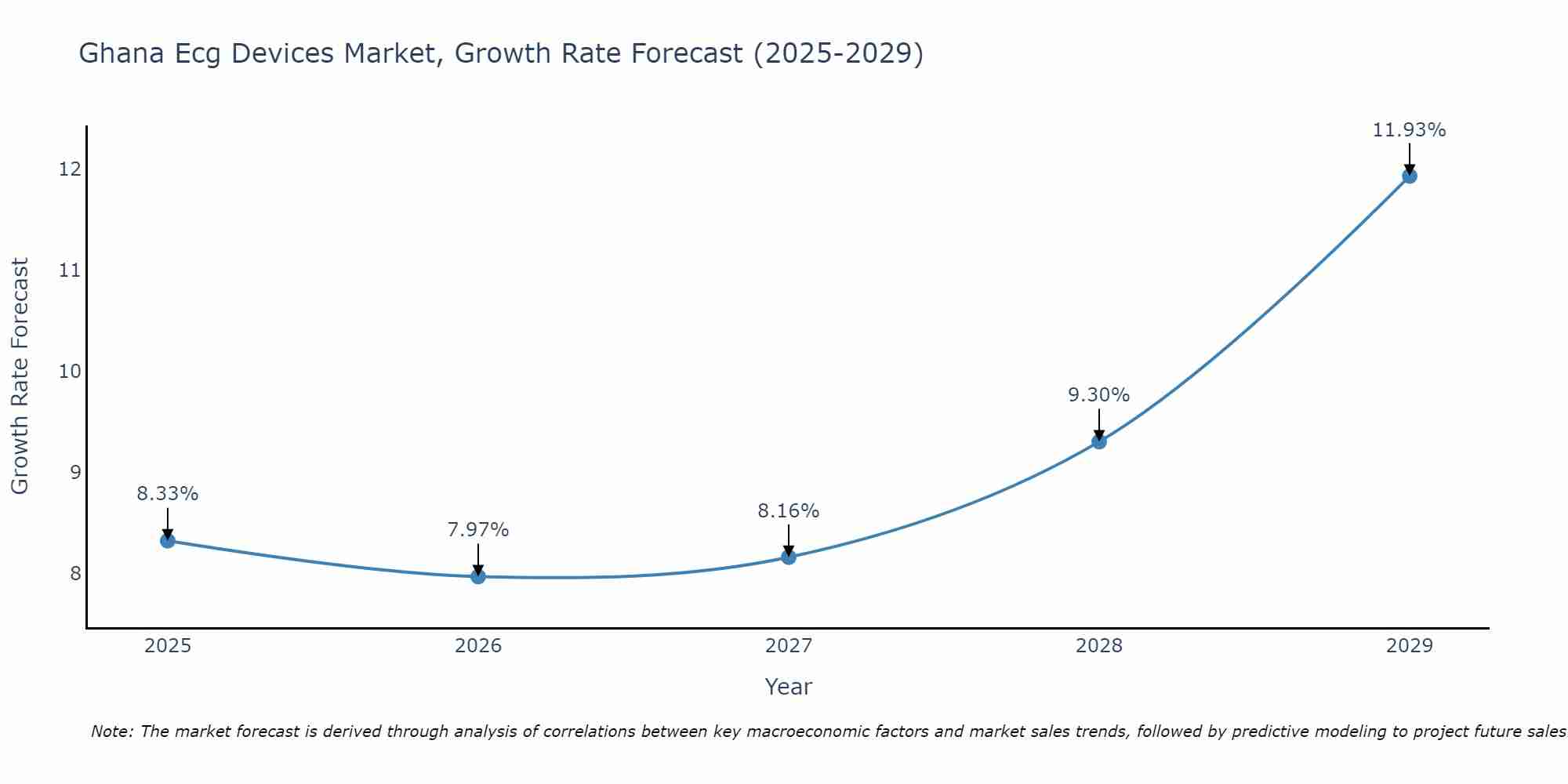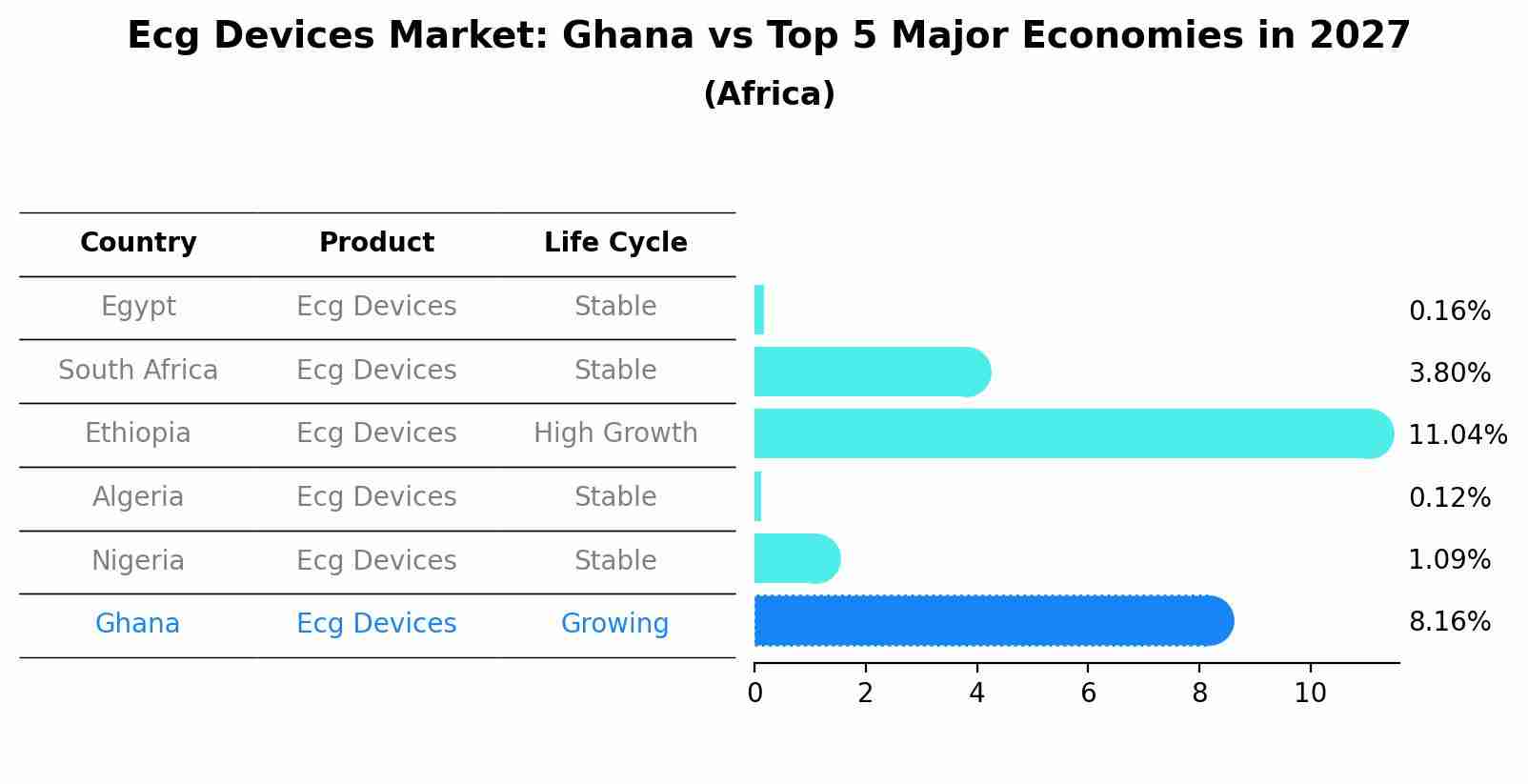Ghana Ecg Devices Market (2025-2031) Outlook | Trends, Revenue, Industry, Value, Size, Growth, Share, Forecast, Companies & Analysis
| Product Code: ETC363416 | Publication Date: Aug 2022 | Updated Date: Aug 2025 | Product Type: Market Research Report | |
| Publisher: 6Wresearch | Author: Shubham Deep | No. of Pages: 75 | No. of Figures: 35 | No. of Tables: 20 |
Ghana Ecg Devices Market Size Growth Rate
The Ghana Ecg Devices Market is projected to witness mixed growth rate patterns during 2025 to 2029. The growth rate starts at 8.33% in 2025 and reaches 11.93% by 2029.

Ecg Devices Market: Ghana vs Top 5 Major Economies in 2027 (Africa)
The Ecg Devices market in Ghana is projected to grow at a growing growth rate of 8.16% by 2027, highlighting the country's increasing focus on advanced technologies within the Africa region, where Egypt holds the dominant position, followed closely by South Africa, Ethiopia, Algeria and Nigeria, shaping overall regional demand.

Ghana Ecg Devices Market Synopsis
The Ghana ECG devices market is experiencing growth driven by factors such as increasing prevalence of cardiovascular diseases, rising awareness about early diagnosis, and advancements in healthcare infrastructure. The market comprises a variety of ECG devices including portable, handheld, and wearable devices catering to the diverse needs of healthcare facilities. Key players in the market are focusing on product innovation and strategic collaborations to gain a competitive edge. Government initiatives to improve healthcare services and increasing healthcare expenditure are further propelling market growth. However, challenges such as limited access to advanced healthcare facilities in rural areas and high cost of devices may hinder market expansion. Overall, the Ghana ECG devices market presents opportunities for growth due to the growing emphasis on preventive healthcare and the adoption of digital health technologies.
Ghana Ecg Devices Market Trends
The Ghana ECG devices market is witnessing a growing demand for portable and wireless ECG devices, allowing for remote monitoring and real-time data transmission. This trend is driven by the increasing prevalence of cardiovascular diseases and the need for continuous monitoring of patients outside hospital settings. Additionally, there is a rising adoption of advanced ECG technologies such as mobile ECG apps and wearable ECG monitors that offer convenience and accessibility to users. The market is also seeing a shift towards integrated ECG systems that combine ECG monitoring with other health parameters for comprehensive health tracking. Overall, the Ghana ECG devices market is experiencing a shift towards innovative and user-friendly solutions that improve patient care and healthcare outcomes.
Ghana Ecg Devices Market Challenges
In the Ghana ECG devices market, challenges include limited access to advanced technology due to high costs, inadequate infrastructure in some regions hindering efficient distribution and usage of devices, and a lack of trained healthcare professionals to operate and interpret ECG results accurately. Additionally, regulatory hurdles and inconsistent enforcement of standards may pose challenges for companies looking to enter or expand in the market. Cultural beliefs and preferences for traditional medicine over modern medical devices also impact the adoption of ECG devices in some communities. Overall, addressing these challenges will require collaboration between government agencies, healthcare providers, device manufacturers, and other stakeholders to improve accessibility, affordability, and awareness of ECG technology in Ghana.
Ghana Ecg Devices Market Investment Opportunities
The Ghana ECG devices market presents promising investment opportunities due to the increasing prevalence of cardiovascular diseases in the country. There is a growing demand for advanced ECG devices that provide accurate and real-time monitoring of heart health. Investing in innovative ECG technologies, such as portable and wireless devices, could cater to the needs of both healthcare facilities and individual consumers. Additionally, partnerships with local healthcare providers and government initiatives to improve cardiac care services can create a favorable market environment for investors. By leveraging the rising awareness of heart health and the expanding healthcare infrastructure in Ghana, investors in the ECG devices market can capitalize on the growing demand for reliable cardiac monitoring solutions.
Jordan Agar Market Government Policies
The Ghanaian government has implemented various policies to regulate the ECG devices market in the country. The Food and Drugs Authority (FDA) is the regulatory body responsible for ensuring the safety, efficacy, and quality of medical devices, including ECG devices, through registration and post-market surveillance. The government has also introduced initiatives to promote local manufacturing of medical devices, which may impact the importation and distribution of ECG devices in the market. Additionally, the government has implemented policies to improve access to healthcare services, which could drive demand for ECG devices in healthcare facilities across the country. Overall, these policies aim to ensure the availability of safe and effective ECG devices in Ghana while promoting local industry growth and enhancing healthcare services.
Ghana Ecg Devices Market Future Outlook
The future outlook for the Ghana ECG devices market appears promising, driven by factors such as the increasing prevalence of cardiovascular diseases, growing healthcare infrastructure, and a rising elderly population. The demand for ECG devices in Ghana is expected to continue to rise as healthcare facilities prioritize early detection and monitoring of heart conditions. Additionally, advancements in technology leading to the development of portable and wireless ECG devices are likely to further fuel market growth. However, challenges such as limited access to healthcare in rural areas and the high cost of ECG devices may pose some barriers to market expansion. Overall, the Ghana ECG devices market is anticipated to experience steady growth in the coming years, offering opportunities for both domestic and international manufacturers.
Key Highlights of the Report:
- Ghana Ecg Devices Market Outlook
- Market Size of Ghana Ecg Devices Market, 2024
- Forecast of Ghana Ecg Devices Market, 2031
- Historical Data and Forecast of Ghana Ecg Devices Revenues & Volume for the Period 2021 - 2031
- Ghana Ecg Devices Market Trend Evolution
- Ghana Ecg Devices Market Drivers and Challenges
- Ghana Ecg Devices Price Trends
- Ghana Ecg Devices Porter's Five Forces
- Ghana Ecg Devices Industry Life Cycle
- Historical Data and Forecast of Ghana Ecg Devices Market Revenues & Volume By Product Type for the Period 2021 - 2031
- Historical Data and Forecast of Ghana Ecg Devices Market Revenues & Volume By ECG Resting System for the Period 2021 - 2031
- Historical Data and Forecast of Ghana Ecg Devices Market Revenues & Volume By ECG Holter Monitoring System for the Period 2021 - 2031
- Historical Data and Forecast of Ghana Ecg Devices Market Revenues & Volume By ECG Stress Testing System for the Period 2021 - 2031
- Historical Data and Forecast of Ghana Ecg Devices Market Revenues & Volume By Cardiopulmonary Stress Testing System for the Period 2021 - 2031
- Historical Data and Forecast of Ghana Ecg Devices Market Revenues & Volume By End User for the Period 2021 - 2031
- Historical Data and Forecast of Ghana Ecg Devices Market Revenues & Volume By Hospitals for the Period 2021 - 2031
- Historical Data and Forecast of Ghana Ecg Devices Market Revenues & Volume By Diagnostic centre for the Period 2021 - 2031
- Historical Data and Forecast of Ghana Ecg Devices Market Revenues & Volume By Clinics for the Period 2021 - 2031
- Historical Data and Forecast of Ghana Ecg Devices Market Revenues & Volume By Ambulatory Surgical Centre for the Period 2021 - 2031
- Ghana Ecg Devices Import Export Trade Statistics
- Market Opportunity Assessment By Product Type
- Market Opportunity Assessment By End User
- Ghana Ecg Devices Top Companies Market Share
- Ghana Ecg Devices Competitive Benchmarking By Technical and Operational Parameters
- Ghana Ecg Devices Company Profiles
- Ghana Ecg Devices Key Strategic Recommendations
Frequently Asked Questions About the Market Study (FAQs):
- Single User License$ 1,995
- Department License$ 2,400
- Site License$ 3,120
- Global License$ 3,795
Search
Thought Leadership and Analyst Meet
Our Clients
Related Reports
- Afghanistan Apparel Market (2026-2032) | Growth, Outlook, Industry, Segmentation, Forecast, Size, Companies, Trends, Value, Share, Analysis & Revenue
- Canada Oil and Gas Market (2026-2032) | Share, Segmentation, Value, Industry, Trends, Forecast, Analysis, Size & Revenue, Growth, Competitive Landscape, Outlook, Companies
- Germany Breakfast Food Market (2026-2032) | Industry, Share, Growth, Size, Companies, Value, Analysis, Revenue, Trends, Forecast & Outlook
- Australia Briquette Market (2025-2031) | Growth, Size, Revenue, Forecast, Analysis, Trends, Value, Share, Industry & Companies
- Vietnam System Integrator Market (2025-2031) | Size, Companies, Analysis, Industry, Value, Forecast, Growth, Trends, Revenue & Share
- ASEAN and Thailand Brain Health Supplements Market (2025-2031) | Strategy, Consumer Insights, Analysis, Investment Trends, Opportunities, Growth, Size, Share, Industry, Revenue, Segments, Value, Segmentation, Supply, Forecast, Restraints, Outlook, Competition, Drivers, Trends, Demand, Pricing Analysis, Competitive, Strategic Insights, Companies, Challenges
- ASEAN Bearings Market (2025-2031) | Strategy, Consumer Insights, Analysis, Investment Trends, Opportunities, Growth, Size, Share, Industry, Revenue, Segments, Value, Segmentation, Supply, Forecast, Restraints, Outlook, Competition, Drivers, Trends, Demand, Pricing Analysis, Competitive, Strategic Insights, Companies, Challenges
- Europe Flooring Market (2025-2031) | Outlook, Share, Industry, Trends, Forecast, Companies, Revenue, Size, Analysis, Growth & Value
- Saudi Arabia Manlift Market (2025-2031) | Outlook, Size, Growth, Trends, Companies, Industry, Revenue, Value, Share, Forecast & Analysis
- Uganda Excavator, Crane, and Wheel Loaders Market (2025-2031) | Strategy, Consumer Insights, Analysis, Investment Trends, Opportunities, Growth, Size, Share, Industry, Revenue, Segments, Value, Segmentation, Supply, Forecast, Restraints, Outlook, Competition, Drivers, Trends, Demand, Pricing Analysis, Competitive, Strategic Insights, Companies, Challenges
Industry Events and Analyst Meet
Whitepaper
- Middle East & Africa Commercial Security Market Click here to view more.
- Middle East & Africa Fire Safety Systems & Equipment Market Click here to view more.
- GCC Drone Market Click here to view more.
- Middle East Lighting Fixture Market Click here to view more.
- GCC Physical & Perimeter Security Market Click here to view more.
6WResearch In News
- Doha a strategic location for EV manufacturing hub: IPA Qatar
- Demand for luxury TVs surging in the GCC, says Samsung
- Empowering Growth: The Thriving Journey of Bangladesh’s Cable Industry
- Demand for luxury TVs surging in the GCC, says Samsung
- Video call with a traditional healer? Once unthinkable, it’s now common in South Africa
- Intelligent Buildings To Smooth GCC’s Path To Net Zero


















